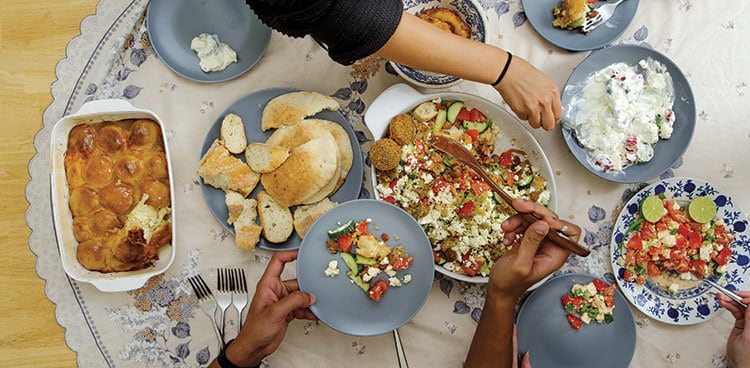Photographed By Manuel Krug
In a Berlin apartment, Omer Eltigani braids soft dough for a gooey goat cheese and honey pie. Hands covered in pastry, he playfully taps wrists with the arriving dinner guests—folks from Germany, the UK, Australia, and the United States. Etta James crackles on an old radio in the corner. Eltigani is a Sudanese home cook turned food entrepreneur whose pop-up events across London, Khartoum, New York, Montreal, and more have been delighting new audiences from all walks of life over the past year.
The Sudanese Kitchen dinners grew from a bout of homesickness. After moving from Birmingham, UK, to Manchester to study pharmacy in 2006, he realized how much he missed his mother’s cooking—and how unknown that same cuisine was to people outside of Sudan.
From there, the Sudanese Kitchen was born. Today, Eltigani holds events (in venues from pubs and concert halls to art spaces and festivals) aimed at introducing a global audience to Sudan’s foodways. At the heart of the pop-ups lies storytelling about the impact of Sudan’s complicated political history on its cuisine, its gender and culinary traditions, and Eltigani’s own migration and integration into new cultures.“I felt too many people (were) missing out on this wonderful food. I wanted to do something about that,” he says. So, in 2015, Eltigani took a short sabbatical from his job as a hospital pharmacist and traveled to Khartoum, Sudan, to see family, learn about national ingredients, tinker with recipes, and start thinking big about his plans to spread the word.
Born in Ireland into a Sudanese family and raised on his mother’s and aunts’ home cooking, Eltigani lived in Khartoum from 1984 to 1990 before moving with his parents—both doctors—to Birmingham, where diversity has a big influence on society and cuisine. “Growing up in the UK defined my identity as a mixture of cultures,” says Eltigani, who speaks four languages, “and my work now embodies this experience—one which I want to relate to and share with a wider audience.”
Since college, Eltigani has been learning about Sudanese food via recipes and tales from his mother and aunts. The country—the third largest in Africa by area—is located in the northeastern part of the continent and is bordered by Egypt, the Red Sea, Eritrea, and Ethiopia.
Years of colonial rule (from Turkey to Egypt to Britain) have played a role in shaping the food culture, as have times of scarcity. Sudanese women have always been central to meal preparation and presentation—it’s unusual to see a man getting his cook on in a Sudanese home. But when he left home for college, Eltigani recorded his family’s recipes and began to tweak and polish them on his own, defying his culture’s gender norms.
As a feminist, he aims to spread traditional and contemporary African recipes far and wide, while amplifying voices that aren’t often heard. He emphasizes women’s roles in Sudanese culture: “Women are the guardians of our sacred food,” he says, “and their work is often overlooked.”
As the fragrant dishes arrive at the table—steaming parcels of gooey cheese sambusa (a type of turnover), salad with local tomatoes and the freshest garden herbs—Eltigani breaks bread, and we discuss the food before us and the traditions and influences surrounding it. While cheese might not be the immediate association with African cuisines (sumptuous lamb and bean stews, delicate bread, complex spice blends, and fruits often come to mind instead), dairy does play a role in Sudanese food, with young, fresh cheeses featured in many recipes.
At the end of the meal, the honey and goat cheese pie makes its entrance. The cheese’s gentle sharpness is complemented by the honey and set off by the cocoon of soft dough glazed with more of the glistening liquid. Our delight and sense of discovery as we eat—along with our understanding as we listen to Eltigani put the foods in context—suggest a way for people to draw closer to understanding each other despite our differences. “The world is going through…a seemingly endless array of social ills,” says Eltigani. “I’m just saying let’s all talk about this over some good food.”






